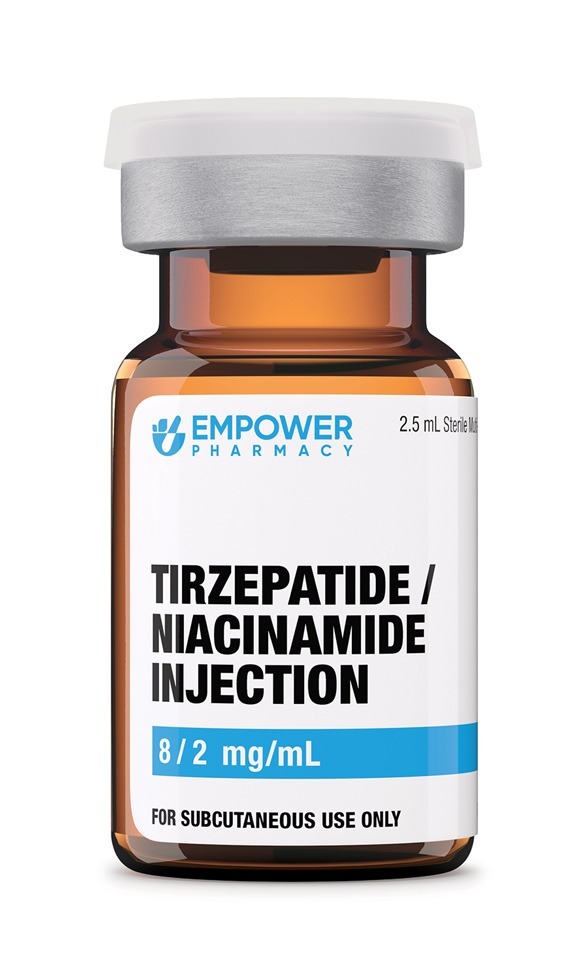Tirzepatide w/niacinamide is the latest once a week injection in Seattle at Well Medical Arts.
You may also call one of our patient care coordinators at 206-935-5689 and we will be happy to assist you in scheduling.
What is the difference between Semaglutide w/niacinimide and Trizepatide w/niacinimide?
Tirzepatide works by mimicking the GLP-1 and GIP hormones that are naturally secreted by the intestine after a meal, which prompts insulin secretion. It also reduces appetite by slowing down the time it takes the stomach to empty and interacting with areas in the brain harboring GLP-1 receptors to signal satiety. Instead of counting calories, the medicine helps a person eat less because it signals to the brain that you’re full.
Can I switch from Semaglutide w/niacinimide to Tirzepatide w/niacinimide?
Because semaglutide and tirzepatide work in different ways and cause different side effects, people’s health should be carefully looked at before transitioning. Both medicines can help with diabetes and obesity, but tirzepatide may help people lose more weight and have better metabolic effects because it works on two different receptors.1 To make sure the patient is safe and happy, though, expectations and side effects must be carefully managed, especially those affecting the digestive system.
Tirzepatide w/niacinimide and Semaglutide w/niacinimide effects on birth control.
Both tirzepatide and semaglutide can reduce the effectiveness of oral contraceptives. It is recommended that prior to starting either medication you consider switching to a contraceptive other than “the pill”. It is also recommended to NOT become pregnant while using either medications.
Is Tirzepatide w/niacinimide more effective than Semaglutide w/niacinimide?
Some research shows tirzepatide might be slightly more effective for weight loss, both drugs, when combined with lifestyle changes, may help people manage their weight and glycemic control. Overall efficacy depends on adherence to treatment and individual factors. Both tirzepatide and semaglutide are effective medications for weight loss. Each person’s body will respond differently to various medications. Therefore, tirzepatide will work for some while others may find more benefits from semaglutide.
What are the potential side effects from Semaglutide w/niacinimide and Tirzepatide w/niacinimide?
Both Tirzepatide and Semaglutide may have potential side effects. These side effects may be mild to severe. Tirzepatide (Mounjaro and Zepbound) may cause nausea, vomiting, diarrhea, constipation, indigestion, and stomach discomfort.
Tirzepatide may have severe side effects but may be rare, which may include:
- Hypoglycemia
- Pancreatitis
- Kidney failure
- Allergic reactions
- Vision changes
- Gastrointestinal issues
- Vision changes
- Stomach pain
Who can NOT take Tirzepatide w/niacinimide?
- You have a personal or family history of medullary thyroid carcinoma (Thyroid Cancer)
- Multiple Endocrine Neoplasia syndrome type 2
- You are pregnant or plan to become pregnant while taking this medicine
- You are diabetic and/or taking any medications related to lowering your blood sugar levels without speaking with your endocrinologist. Specifically, if you are prescribed Insulin because the combination may increase your risk of hypoglycemia (low blood sugar) and dosage adjustments by your provider may be necessary.
- You have a history of Pancreatitis
- You are allergic to BPC-157, Semaglutide, Tirzepatide or any other GLP-1 agonist such as: Adlyxin®, Byetta®, Bydureon®, Ozempic®, Rybelsus®, Trulicity®, Victoza®, Wegovy® Monjauro or Zepbound.
- If you have other allergies. This product may contain inactive ingredients, which can cause allergic reactions or other problems. Talk to your pharmacist for more details. Before using this medication, tell your doctor/pharmacist your medical history .
- Kidney disease. Stomach or intestine problems. Thyroid cancer or if someone in your family had thyroid cancer. An unusual or allergic reaction to tirzepatide, other medications, foods, dyes, or preservatives.
Possible drug interactions with Tirzepatide w/niacinimide.
- Semaglutide and Tirzepatide can make oral contraceptive less effective. It is recommended that if you are considering starting either of these medications you use an alternative form of contraception and it is recommended to NOT get pregnant on these medications.
- Any blood thinning medications (warfarin) can be affected, it can slow the absorbtion of the medication. It is not recommended to use Semaglutide or Tirzepatide if you are taking blood thinning medications.
- Any Anti-diabetic agents, specifically: Insulin and Sulfonylureas (e.g., g lyburide, glipizide, gl imepiride, tolbutamide) due to the increased risk of hypoglycemia (low blood sugar).
- Do not take with other GLP-1 agonist medicines such as: Adlyxin®, Byetta®, Bydureon®, Ozempic®, Rybelsus®, Trulicity®, Victoza®, Wegovy® (THIS IS NOT AN ALL-INCLUSIVE LIST).
- Other medications used in diabetes, please tell your provider about any medications that may lower your blood sugar.
You may also call one of our patient care coordinators at 206-935-5689 and we will be happy to assist you in scheduling.


